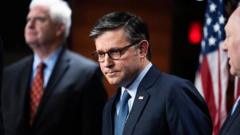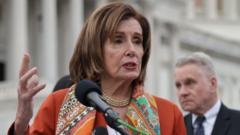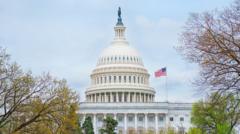**Congress is grappling with a significant spending proposal aimed at extending funding while addressing disaster aid, but internal disagreements among Republicans could threaten its passage.**
**Congressional Leaders Propose Major Spending Bill Amid Shutdown Crisis**

**Congressional Leaders Propose Major Spending Bill Amid Shutdown Crisis**
**Policy package combines disaster relief and unrelated measures, facing Republican dissent.**
In a pivotal move aimed at preventing a government shutdown, congressional leaders have unveiled a comprehensive spending bill that proposes to maintain government funding through mid-March while directing nearly $100 billion towards disaster relief efforts. The measure, which spans over 1,500 pages, includes substantial allocations such as $10 billion in economic assistance to farmers affected by recent natural disasters, along with an additional $21 billion dedicated to broader disaster relief initiatives.
This legislation emerged from intense negotiations between Democrats and Republicans who were eager to come to an agreement ahead of a looming Friday deadline. The bill ensures that government funding levels remain steady while postponing further budget-related discussions until March 14. However, the attachment of several unrelated policy amendments related to health care, energy, and digital privacy might sow discord within Republican ranks, as some lawmakers express concern over the all-encompassing nature of the bill.
According to sources within the House, Speaker Mike Johnson may encounter pushback from within his party. A faction of House Republicans, including several traditional conservatives, have voiced their reluctance to endorse the spending package, arguing that it overburdens the bill with excessive policies.
At a recent news conference, Speaker Johnson articulated the necessity of the legislation, highlighting the urgent need for disaster relief following severe weather events, such as hurricanes that struck the Southeast. He emphasized that Congress has a responsibility to respond effectively, calling the current situation a response to “acts of God” that warrant immediate attention.
While the initial intention for this bill was a straightforward, uncomplicated continuing resolution, the evolving legislative landscape may lead to a tougher battle ahead, particularly as Republicans evaluate their strategy with the new year approaching. The developments exemplify the complexities of governing amidst competing priorities, raising questions about the fiscal path forward for Congress.



















